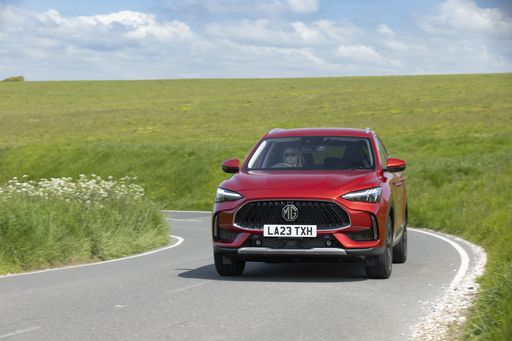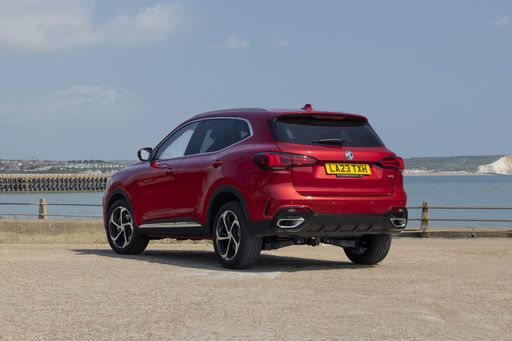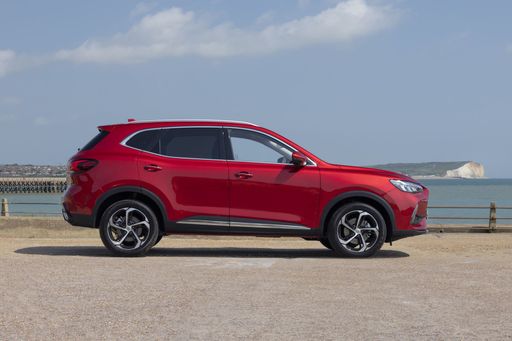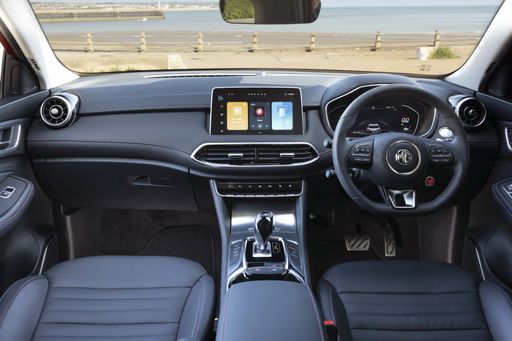Hyundai Bayon vs MG HS – Differences & prices compared
Compare performance, boot space, consumption and price in one view.
Find out now: which car is the better choice for you – Hyundai Bayon or MG HS?
The Hyundai Bayon (SUV) comes with a Petrol engine and Manuel or Automatic transmission. In comparison, the MG HS () features a engine with transmission.
When it comes to boot capacity, the Hyundai Bayon offers 411 L, while the MG HS provides – depending on how much space you need. If you’re looking for more power, decide whether the 100 HP of the Hyundai Bayon or the of the MG HS suits your needs better.
In terms of consumption, the values are 5.40 L per 100 km for the Hyundai Bayon, and for the MG HS.
Price-wise, the Hyundai Bayon starts at 20100 £, while the MG HS is available from . Compare all the details and find out which model fits your lifestyle best!
Hyundai Bayon
The Hyundai Bayon is a compact crossover that effortlessly merges practicality with modern design. Its sleek exterior and spacious interior make it an ideal choice for urban settings and longer journeys alike. With a focus on comfort and connectivity, this vehicle provides a smooth driving experience paired with advanced technology features.
details @ hyundai.news
@ hyundai.news
 @ hyundai.news
@ hyundai.news
 @ hyundai.news
@ hyundai.news
 @ hyundai.news
@ hyundai.news
 @ hyundai.news
@ hyundai.news
MG HS
The HS impresses with its sleek design and stylish exterior, setting a new standard in its class. Inside, it offers a spacious and comfortable cabin, complete with modern features that enhance the driving experience. With its focus on practicality and performance, the HS stands out as a compelling choice for those seeking a versatile and appealing vehicle.
details @ mg.co.uk
@ mg.co.uk
 @ mg.co.uk
@ mg.co.uk
 @ mg.co.uk
@ mg.co.uk
 @ mg.co.uk
@ mg.co.uk

|

|
|
|
|
Costs and Consumption |
|
|---|---|
|
Price
20100 - 25800 £
|
Price
-
|
|
Consumption L/100km
5.4 - 5.5 L
|
Consumption L/100km
-
|
|
Consumption kWh/100km
-
|
Consumption kWh/100km
-
|
|
Electric Range
-
|
Electric Range
-
|
|
Battery Capacity
-
|
Battery Capacity
-
|
|
co2
124 g/km
|
co2
-
|
|
Fuel tank capacity
40 L
|
Fuel tank capacity
-
|
Dimensions and Body |
|
|---|---|
|
Body Type
SUV
|
Body Type
-
|
|
Seats
5
|
Seats
-
|
|
Doors
5
|
Doors
-
|
|
Curb weight
1170 - 1195 kg
|
Curb weight
-
|
|
Trunk capacity
411 L
|
Trunk capacity
-
|
|
Length
4180 mm
|
Length
-
|
|
Width
1775 mm
|
Width
-
|
|
Height
1500 mm
|
Height
-
|
|
Payload
460 - 465 kg
|
Payload
-
|
Engine and Performance |
|
|---|---|
|
Engine Type
Petrol
|
Engine Type
-
|
|
Transmission
Manuel, Automatic
|
Transmission
-
|
|
Transmission Detail
Manual Gearbox, Dual-Clutch Automatic
|
Transmission Detail
-
|
|
Drive Type
Front-Wheel Drive
|
Drive Type
-
|
|
Power HP
100 HP
|
Power HP
-
|
|
Acceleration 0-100km/h
11.3 - 12.4 s
|
Acceleration 0-100km/h
-
|
|
Max Speed
176 - 179 km/h
|
Max Speed
-
|
|
Torque
172 - 200 Nm
|
Torque
-
|
|
Number of Cylinders
3
|
Number of Cylinders
-
|
|
Power kW
74 kW
|
Power kW
-
|
|
Engine capacity
998 cm3
|
Engine capacity
-
|
General |
|
|---|---|
|
Model Year
2024
|
Model Year
-
|
|
CO2 Efficiency Class
D
|
CO2 Efficiency Class
-
|
|
Brand
Hyundai
|
Brand
-
|
Hyundai Bayon
Introducing the Hyundai Bayon: A New Era in Compact SUVs
The Hyundai Bayon, a compact SUV designed with urban adventurers in mind, is making waves with its exceptional blend of style, performance, and technology. The brand has pulled out all the stops to ensure that the Bayon stands out in the crowded SUV market, offering a vehicle that is both practical and innovative.
Sleek Design and Cutting-Edge Aerodynamics
The Bayon features a striking exterior design, characterised by its bold lines and angular shapes. With a length of 4180 mm, a width of 1775 mm, and a height of 1500 mm, the Bayon commands attention with its modern appeal and aerodynamic efficiency. These dimensions not only contribute to its sleek design but also enhance fuel efficiency, achieving an impressive 5.4 L/100 km.
Engine Performance and Specifications
Under the bonnet, the Bayon is powered by a 1.0-litre T-GDI petrol engine, delivering a robust 100 PS or 74 kW. This engine is available with either a manual or automatic gearbox, meeting varied driver preferences. The front-wheel-drive system complements its urban-centric design, ensuring a smooth and responsive ride.
Maximised Interior Space and Comfort
The spacious interior of the Bayon accommodates up to five passengers comfortably. The vehicle boasts a boot space of 411 litres, perfect for both everyday use and weekend getaways. The cabin is designed with practicality and technology in mind, with intuitive controls and ample storage options.
Advanced Technology and Connectivity
Hyundai has equipped the Bayon with state-of-the-art technology to enhance the driving experience. The SUV features a high-resolution touchscreen, offering seamless connectivity with Apple CarPlay and Android Auto. Safety is also a priority, with multiple driver assistance systems including lane-keeping assist and forward collision avoidance assist.
Environmental Efficiency
Despite its powerful performance, the Bayon achieves a respectable CO2 efficiency class of D, with emissions as low as 122 g/km. This balance between performance and environmental responsibility makes the Bayon an attractive option for conscientious drivers.
Affordability and Market Appeal
The Hyundai Bayon is competitively priced, ranging from €22,900 to €29,600. Its affordable running costs, estimated at 32.3 to 36.4 cents per kilometre, further enhance its appeal to budget-conscious consumers. With monthly costs ranging from €806 to €909, the Bayon provides excellent value without compromising on features or performance.
Final Thoughts
The Hyundai Bayon truly stands out in the compact SUV segment, combining style, innovation, and practicality in an appealing package. It offers a versatile driving experience suited to the demands of modern urban living, making it a top contender in its class. As Hyundai continues to champion forward-thinking design and technology, the Bayon is a testament to the company's ongoing commitment to excellence.
MG HS
Introducing the MG HS: A Fusion of Style and Performance
The MG HS is making its mark as a standout contender in the increasingly competitive SUV market. Known for its blend of stylish design, advanced technologies, and impressive performance, the HS caters to a variety of drivers looking for a reliable and dynamic vehicle. In this article, we dive into the technical aspects and innovations that make the MG HS a remarkable choice for 2024.
Dynamic Powertrains
The MG HS is equipped with an array of powertrain options that emphasize performance while maintaining efficiency. The standout engine is the 1.5T GDI petrol unit, delivering a solid 170 horsepower across various gearbox options, including both manual and automatic transmissions. The manual variants offer a fuel consumption of 7.4 L/100km, while the automatic versions slightly increase this to 7.6 L/100km, appealing to those who prefer a more effortless driving experience.
On the eco-friendly front, the MG HS also features a plug-in hybrid variant, the 1.5T GDI PHEV, which boosts power to an impressive 272 HP. This PHEV model touts an efficiency rating of just 0.5 L/100km and offers an electric-only driving range of up to 100 km. This innovation highlights MG's commitment to sustainability without compromising on performance.
Design and Dimensions
The MG HS boasts a contemporary SUV design characterized by fluid lines and a bold front grille that commands attention on the road. Measuring between 4655 mm and 4670 mm in length and 1890 mm in width, it is spacious enough to accommodate five passengers comfortably. The HS features a generous trunk capacity ranging from 441 L to 507 L, making it practical for family trips or everyday errands.
With a height of either 1663 mm or 1664 mm, passengers benefit from ample headroom and an airy cabin feel. The vehicle’s well-crafted interior is designed with emphasis on comfort and functionality, positioning the MG HS as a reliable choice for both urban and adventurous outings.
Technological Innovations
The MG HS is not just about performance and design; it also integrates advanced technology features aimed at enhancing the driving experience. The infotainment system includes a user-friendly touchscreen that supports both Android Auto and Apple CarPlay, allowing seamless connectivity with smartphones. In addition, various trim levels offer features such as leather upholstery, panoramic sunroofs, and advanced driver-assist systems ensuring both safety and comfort.
Safety is another cornerstone of the MG HS, equipped with multiple airbags, electronic stability control, and an advanced braking system. This commitment to safety aims to provide peace of mind for drivers and their families on the road.
Efficiency and Driving Experience
With a CO2 efficiency class ranking from F to B, the MG HS demonstrates its ability to balance performance with environmental considerations. The manual versions achieve a 0-100 km/h acceleration in approximately 9.4 to 9.6 seconds, while the plug-in hybrid variant speeds the process up to an impressive 6.8 seconds.
Coupled with a maximum speed of up to 195 km/h, the MG HS ensures a thrilling and engaging driving experience, whether navigating city streets or cruising on the highway. Its adaptive handling and responsive steering provide precise control, making every drive enjoyable.
Conclusion: The MG HS Stands Out in 2024
In the ever-evolving automotive landscape, the MG HS emerges as a formidable player, brilliantly combining style, performance, and modern technology. With its array of powerful engines, significant advancements in hybrid technology, and a focus on driver and passenger comfort, the HS is poised to be a popular choice among SUV enthusiasts in 2024. Whether opting for a petrol variant or embracing the hybrid revolution, the MG HS offers a driving experience that caters to contemporary needs without sacrificing excitement.
Which drive types are available for the Hyundai Bayon?
Available as Front-Wheel Drive.
The prices and data displayed are estimates based on German list prices and may vary by country. This information is not legally binding.
